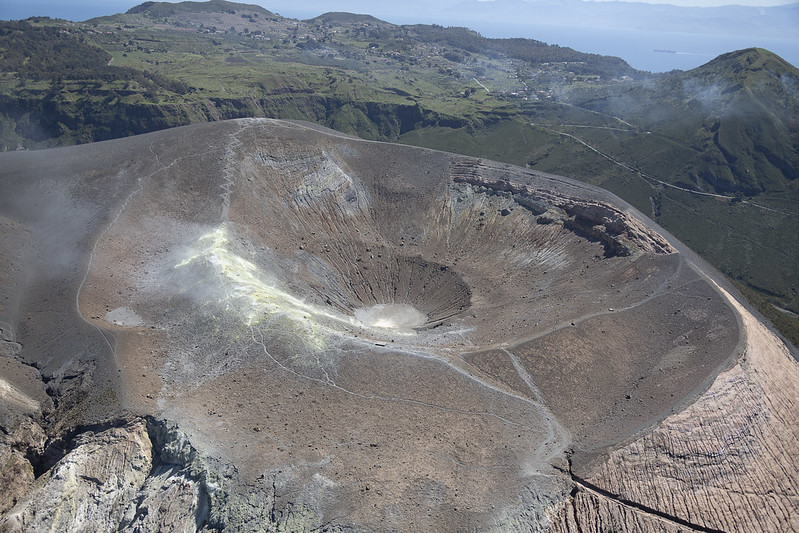What to do - Vulcano

Awareness of risk and knowledge of the Civil Protection Plan is a responsibility for all of us.
Share what you know with family, school, friends and colleagues: spreading information about volcanic risk is a collective responsibility, and we all have to contribute.
- Do not use basement and basement rooms for living, working, recreational activities. Do not use them at night for sleeping, and do not allow unaccompanied children access to them.
- Always ventilate premises (especially those that have been closed for a long time or buried or basements such as cellars and garages).
- Learn about the Lipari Municipality's Civil Protection Plan to know the removal procedures and the waiting area you should go to in case of an alarm.
- If you or someone in your family needs special assistance (people with disabilities, old people) inform the municipality.
- Visit the Info Point of the National Institute of Geophysics and Volcanology, open during the tourist season, or the websites of the Aeolian Monitoring Center, INGV's Etnean Observatory, and the Department of Civil Protection.
- Participate in exercises and information meetings on volcanic risk organized in the area.
- There are emergency signage on the island. Read carefully to know and adopt the correct behaviors.
During this operational phase, the monitoring is intensified and the Civil Protection Plan is being checked and updated. Access to some areas of the island, affected by high ground gas emission, may be prohibited.
Ask the Municipality for information on the Civil Protection Plan, to know the removal routes, waiting areas, and meeting areas to reach in case the alert phase is declared and it is necessary to leave the island.
Find out about current Municipal Ordinances and follow the directions.
Avoid depressed areas and structures where volcanic gases may accumulate (basements, garages, empty swimming pools, water collection channels, underground cisterns, wells, etc.).
If you have to access them, reduce the time of stay as much as possible and make sure there is someone outside who can help.
Avoid areas near volcanic gas emissions, especially during nighttime and during unfavorable weather conditions (no wind, cloudy, foggy).
If you notice potentially dangerous situations related to volcanic gas emissions, such as the presence of dead animals for no apparent reason, move away immediately and notify the municipality.
Remember to notify the municipality if you or a family member has special assistance needs for possible removal in the alarm phase and accommodation in alternative housing.
Plan early on what you would do if authorities give the direction to remove you from your home and notify the municipality. You may have to relocate outside the island's risk areas:
- to another home;
- to housing provided by the municipality.
In this phase evacuation operations begin for people with special social and health care needs. Only citizens with stable and continuous residence and civil protection operators are allowed to stay on the island.
If you have the possibility of an alternative independent accommodation outside the island, you can already move out during this phase. If so, inform the Municipality.
As a tourist, you will be asked to leave the island with the means of transport of the shipping companies that regularly connect the island to the mainland.
The transfer and assistance of people who need special social and health assistance will be provided.
If you decide to stay, be ready to leave when the authorities instruct you to do so.
Learn about the evacuation procedures provided in the Civil Protection Plan of the Municipality.
Inform the Municipality if you or a family member has special assistance needs.
Make a list of essentials (phone, documents, medicines, glasses, etc.).
Find out about the Municipality's Ordinances restricting access and permanence on the island.
In this operational phase, the IT-alert message is sent to warn of a potential impending eruption. During the alarm phase, the entire population is expected to be evacuated from the island. Operations are coordinated by civil protection authorities.
- Remember to take the essentials (phone, documents, medicines, eyeglasses, etc.).
- Do not waste time securing items you will not bring with you.
- Before leaving the house close doors, windows, gas, water and turn off the electricity.
- Reach the waiting area or meeting area designated to you by the Municipal Civil Protection Plan, according to the schedule. The removal from the island will take place by sea from Porto di Levante or molo di Gelso; if necessary, from molo di Ponente with naval means or also with helicopters. Follow the instructions provided by the civil protection authorities.
- You can bring your pet with you, according to the indications provided by the Municipality.
- Remember that the island may be closed for a long time.
- Keep yourself informed about the activity and the status of the volcano by consulting the sources of information through websites and institutional social media (of Municipality, Regional Department of Civil Protection, National Department of Civil Protection), television, radio, press, and toll-free numbers (Contact Center of the Department of Civil Protection, Regional Operations Room).